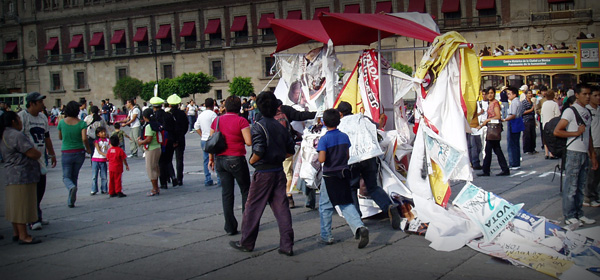
Since 1992, Antimuseo de Arte Contemporáneo have worked with mechanisms that seek to legitimize a work of art with a view to push back the borders of art institutions, as well as acting upon their structures and creating counter-audiences. This is a curatorial project undertaken by a non-profit organization led by María María Acha and Tomás Ruiz-Rivas.
The two worked under the name Ojo Atómico on a site-specific program in an old factory in Madrid, Spain. Without their own premises, although now working under their current name, Antimuseo began to move among a number of environments: disused premises: houses, public spaces… In 2003 they settled in Madrid and began working on models of participation and contextualization of art within social settings. After the closing of their exhibition space in 2007, they focused their projects on public spaces, such as the Centro Portátil de Arte Contemporáneo program in Mexico (2009) and the exhibition ‘Mano a mano con el General Cárdenas’ (Hand in hand with General Cárdenas, Mexico, 2011), which consists of a series of pieces of work located at and around a monument to former Mexican president Lázaro Cárdenas.
Antimuseo’s contribution to MED11 is a project they have undertaken in the field with the Centro Portátil de Arte Contemporáneo, a mobile unit designed to offer support to creative processes in public spaces. The project will be based on a workshop which will allow the involvement of a number of the city’s artists and cultural and social agents.
The creators see this workshop as a pedagogical model which has “a structure that everyone is aware of and which is highly practical in the complex work we have to undertake in just 3 weeks”.
“Consumption is the moment at which a significant work of art is produced”. The Antimuseo Manifesto
Website
www.antimuseo.org
Links of interest
The Antimuseo Manifesto
More information
info@antimuseo.org
Facebook
Youtube
Vimeo


 Sending data...
Sending data...
[…] Antimuseo, dirigido por María María Acha y Tomás Ruiz-Rivas, tiene como pilares ideológicos la noción del contrapúblico, la crítica institucional y la idea de que la creación artística no es un proceso individual, en cuanto el artista requiere de una construcción social para producir significado. […]